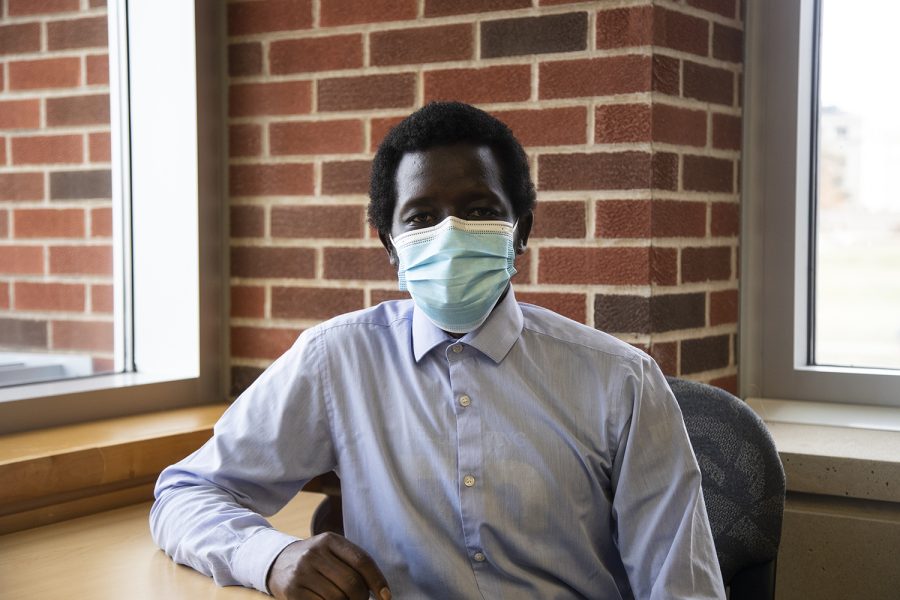UI students debate wearing masks as COVID-19 cases rise
The university community is questioning whether to wear masks to help control the spread of illnesses.
University of Iowa graduate teaching assistant and PhD student in mass communication, David Lomoywara, poses for a portrait inside the Adler Journalism Building at the University of Iowa on December 2, 2022.
December 4, 2022
Nearly three years after the beginning of the COVID-19 pandemic, UI students are choosing whether to mask up as seasonal illnesses spread across campus.
The choice to wear a mask during flu and cold season as a way to protect yourself against various illnesses is still relatively new, Sam Jarvis, Johnson County Public Health Department community health division manager, said.
“Many folks were aware of covering your cough and washing your hands, staying home when you’re ill. But because of the pandemic, the awareness has been heightened,” Jarvis said.
There are currently 106 recorded COVID-19 cases in Johnson County as of Nov. 30.
Alison Phillips, Iowa State University associate professor of psychology, wrote in an email to The Daily Iowan that there are different factors that influence how people choose to mask.
“Descriptive norms are individuals’ beliefs about how common a behavior is, and this has definitely increased (mask-wearing is more common now than before the COVID-19 pandemic, which we can all observe in those around us),” Phillips wrote. “Injunctive norms are individuals’ beliefs about how much they think others think they should be doing a behavior.”
Some UI students identified people wearing masks as indications the student is ill, and that they should be more wary of them.
RELATED: Local hospitals see uptick in pediatric respiratory illnesses
UI first-year student Galilea Flores said the presence of people masking is still common in her day-to-day life.
“I have noticed some of my classmates in class randomly coming in one day with a mask,” Flores said. “I feel like as soon as you see that you automatically form this whole perception that ‘Oh, they’re sick.’”
If Flores was sick, she would choose to protect others from her illness, she said.
“Personally, I would choose to mask if I do happen to come across a cold one day,” Flores said. “It just makes other people feel more comfortable in the space.”
Masking up should be standard practice now in the UI, she said.
“I think that we should just normalize people wearing masks nowadays. I think people feel more comfortable being around people with a mask on, especially when someone’s sick,” Flores said. “I think it’s just important to create that atmosphere in the classroom and an understanding of people.”
Even if not all students wear masks when sick, other hygienic practices are taken into consideration when one feels ill. UI first-year student Colin Meehan said he tries to limit his exposure to people to not spread any illness he may have contracted.
“Typically, I don’t wear a mask,” Meehan said. “I [go] to my classes, and then I’ll just go back to my dorm and stay in there. I limited outside contact and only went out when I needed to.”
Meehan said he is choosing to stay away from others, especially when he is sick, to protect himself and others and to slow the spread of diseases.
“A lot more people are getting sick,” Meehan said. “I don’t want to get sick as well, and I don’t want to get other people sick, so that’s why I limited my time outside and only going outside when I really had to.”




